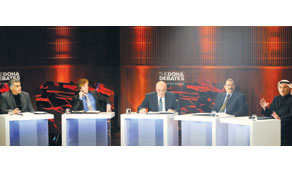 |
| Nabeel Rajab, Christopher Davidson, Tim Sebastian, Abdulla Alderazi and Khaled al-Maeena participate in the debate on Bahrain’s future, held at the Georgetown School of Foreign Service in Qatar for the first time. PICTURES: Jayan Orma |
The willingness and capability of the Bahraini authorities to implement reforms in the kingdom came under the spotlight at the Doha Debates last night, where 78% of the audience voted in favour of the motion that: ‘This house has no confidence in Bahrain’s promises to reform.’
Chairman of the debates, Tim Sebastian introduced the discussion by referring to the recent report commissioned by King Hamad bin Isa al-Khalifa into the violence and alleged torture which took place in Bahrain earlier this year, describing it as “chilling reading,” but reminding the audience that this report represents an unprecedented step for a monarch in admitting that mistakes had been made and serious offences committed.
First to speak for the motion was human rights activist and president of the Bahrain Centre for Human Rights, Nabeel Rajab, who passionately expressed his belief that the current regime must be changed if any reform is to take place in Bahrain.
“How can we trust a government which has been there for 42 years to make any reforms?” he asked incredulously, arguing that member of the ruling family have such control over the country that any meaningful dialogue or reform process is impossible while the current regime remains intact.
He suggested the King Hamad made a calculated choice to commission his own inquiry into the violence rather than allowing a UN inquiry to investigate, allowing him to distance himself from accepting responsibility for events.
Editor-at-large of Saudi-based Arab News, Khaled al-Maeena was first to speak against the motion, expressing his opinion that the actions of young people throughout the Arab world have made reform an inevitability for Bahrain and other countries in the region.
He said Bahraini authorities will have to reform if they wish to remain in power, describing the issue as one of survival as opposed to a choice.
“The events were extremely sad and should never have happened,” he said, adding “the focus of the world is now on the Arab world and no longer can leaders afford to ignore these people.”
“Young people will not take the nonsense they took before,” he added.
Next to speak for the motion was Christopher Davidson from the University of Durham, an expert and author of numerous books about politics in the region. Davidson referred to the measures being taken by the king as “papering over cracks,” claiming that the ruler has been taking face-saving measures for the past 10 years to ensure that he remains in power.
He mentioned that the authorities in Bahrain have “constructed their own narrative” about the intentions of Shia Muslims in Bahrain and the potential influence of Iran, should the regime collapse.
He also brought up the interesting issue of other Gulf monarchies, who he said are adamant that King Hamad does not fall, as his collapse could signify an important shift in attitude towards monarchies in the region.
Lecturer from the University of Bahrain, Abdulla Alderazi, who actually lost his job during the protests earlier this year, was last to speak, and he referred to his experience as a appointee to the government’s national committee established to respond to the findings of the recent report.
He suggested that change is coming to the country through a leadership which is willing and capable of introducing significant reforms, arguing that national reconciliation is necessary for the future of a “better Bahrain.”
Alderazi said the government must release all detainees, drop all charges against them, reinstate people into their jobs and indicate a true intention to introduce reform, if they wish to remain in power and create a better future for a unified nation.
The audience included a number of Bahraini citizens, including a young activist who explained that her husband has been imprisoned for the past eight months because of their role in the protests.
She, like many others, demanded to see significant changes in the immediate future, rather than the seemingly empty promises referred to by Davidson and Rajab.
Others questioned the will of the protesters to involve themselves in a meaningful reconciliation programme, but eventually it was the proposition who won out in the end, casting sufficient doubt on the intentions of the Bahraini authorities to reform, to win a spirited and interesting debate.

